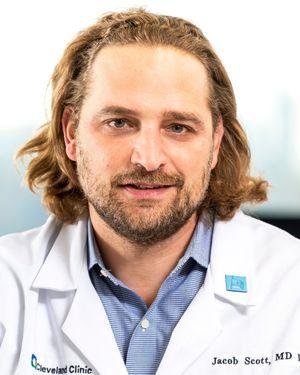Research News
08/04/2021
Study Confirms Effectiveness of New Personalized Approach for Radiation Therapy
Dr. Scott and colleagues validated the genomic-adjusted radiation dose to be beneficial as a pan-cancer predictor of radiation therapy efficacy in new clinical study.

Researchers from Cleveland Clinic, Case Western Reserve University School of Medicine and Moffitt Cancer Center have found that the genomic-adjusted radiation dose (GARD) may be used to personalize radiotherapy to maximize treatment efficacy among patients with cancer.
Published in Lancet Oncology, the research validates the association between GARD and radiation therapy outcomes in a large cohort of patients across seven cancer types.
“As opposed to physical radiotherapy dose, which is the measure of what comes out of the machine and is delivered to the patient, GARD quantifies the biological effect of the delivered dose on an individual patient,” said the study’s first author Jacob Scott, MD, DPhil, a Cleveland Clinic radiation oncologist and Case Western Reserve University School of Medicine associate professor. “What we’ve found by looking at more than 1,600 patients is that the physical dose of radiation is not associated with clinical outcome, but GARD is.”
According to Moffitt Cancer Center radiation oncologist Javier Torres-Roca, MD, the new study findings change the field of radiation therapy.
“Historically, it’s been accepted that radiation therapy—a physical treatment—causes a biologic or clinical effect in patients with regard to tumor response, toxicity, carcinogenesis, etc.,” Dr. Torres-Roca said. “Up to now, radiation oncologists have always assumed that the biologic effect was uniform across patients. GARD, however, provides the first validated approach to quantify the biological effect of radiotherapy for each patient and tells us more about the clinical outcome and treatment benefit than the physical dose.”
In 2017, the team first devised and introduced the concept of GARD. In the current study, they used previously published data on cancers of the breast, head and neck, endometrium, skin, brain, pancreas and lung to test the association between GARD, radiotherapy disease and patient outcomes, including time to first recurrence and overall survival. To test whether the GARD-based dosing paradigm was associated with outcomes, the researchers performed a pooled pan-cancer analysis using data from 1,615 patients from 11 cohorts.
“Importantly, GARD is not a standalone biomarker. Rather, it’s a dynamic parameter that changes based on the prescribed radiation dose, allowing clinicians to directly modulate it,” said Dr. Scott, who is also a researcher in the Department of Translational Hematology & Oncology Research.
They found that as GARD values increase, so does the predicted therapeutic benefit of radiotherapy at that specific dose. For some radiation plans, however, these increases may not be worth the risk of dose escalation. “While some patients have large increases in GARD with more dose, some patients do not respond as well near the range of standard of care. It remains paramount to discuss treatment plans and the risk-benefit of dose escalation versus increased toxicity between clinician and treating oncologist.”
Dr. Torres-Roca believes this analysis provides enough evidence to justify initial clinical adoption of the GARD-based dosing paradigm. “This does not require a departure from the current standard of care,” he emphasized. “Our view is that GARD is a decision support tool that provides a view of the effect of radiotherapy for each individual patient, offering critical information for radiation oncologists.”
The test is now available from a CLIA laboratory at Moffitt Cancer Center and researchers hope to make it available more widely by engaging with a large-scale genomics company.
To read the full press release from which this article is adapted, visit the Cleveland Clinic Newsroom.
Featured Experts
News Category
Related News
Research areas
Want To Support Ground-Breaking Research at Cleveland Clinic?
Discover how you can help Cleveland Clinic save lives and continue to lead the transformation of healthcare.
Give to Cleveland Clinic